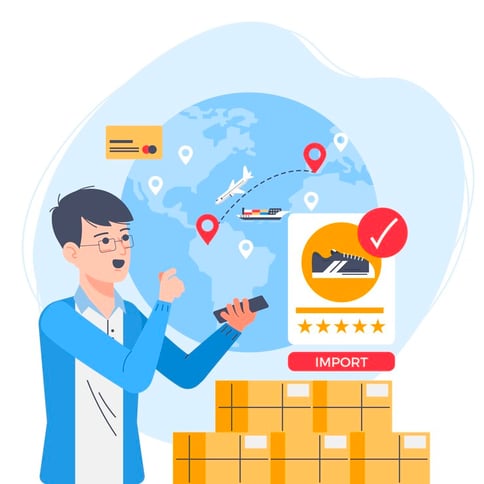How To Find Dropshipping Suppliers: 6 Advanced Tips

Source: FreePik
If you’ve been in the dropshipping game for a while, you’ll know that optimizing your operation is an important step to become profitable. While it’s tempting to focus solely on branding, advertising, and your Amazon listings, there are other areas you need to optimize, too.
When was the last time you rethought your suppliers? Low-quality products, shipping delays, and bad returns might be your supplier’s fault, but your customers will blame you.
Every successful dropshipper succeeds because of its strong supplier relationships. A subpar supplier means you have a subpar operation. If you’ve resigned yourself to working with less-than-great suppliers because it’s hard to find other options, don’t settle.
Let’s dig into why you need an awesome supplier and six ways to find the perfect one for dropshipping.
Why Is It So Important to Find the Right Dropshipping Suppliers?
Dropshippers depend on suppliers to ship and store products, so if you choose a bad supplier, many things go south fast.
You should prioritize finding the best possible supplier, because bad suppliers:
❌ Hurt your credibility: The product carries your name, not the suppliers’. If the supplier handles shipping, storage, or returns badly, the customer will blame you.
❌ Lead to bad customer reviews: You can kiss your eCommerce optimization strategies goodbye if your supplier is treating your customers poorly. The more one-star reviews you collect, the harder it is to attract and retain shoppers.
❌ Don’t stay in stock: If your supplier is always running out of inventory, it reflects badly on you. Not only will you miss out on those sales, your reputation will also be harmed.
As a dropshipper, every part of your business is influenced by your supplier. This can feel scary, because it means you don’t have a lot of control over many aspects of your business—therefore, finding a high-quality supplier is paramount for enhancing your business’s stability and success.
6 Tips to Find the Perfect Dropshipping Supplier
There are many aspects to finding the best supplier for your dropshipping store.
As your business grows, you’ll want to negotiate deals that put you in the best position possible. This starts with your supplier. Follow these six tips to sidestep subpar wholesalers and find the right supplier for your business.
1️⃣ Contact manufacturers
While you can consult Google for suppliers, it’s a good idea to go directly to the manufacturer first. If you have a target product in mind, ask the manufacturer for a list of approved suppliers.
For example, if you were selling fidget spinners, you could approach the fidget spinner manufacturer to see who they use as a distributor. They’re usually happy to send you a list of approved distributors. This is by far the fastest way to find trustworthy suppliers.
To maximize your odds of success, you can choose multiple approved suppliers using a tool like Spark Shipping. Our intelligent order routing feature lets you route the order to the lowest-cost in-stock supplier.
2️⃣ Consult dropship supplier directories
A supplier directory is a specialized database that houses trustworthy suppliers for quick reference. Some directories include multiple dropshipping suppliers and even include reviews, so you can consider other dropshipper's experiences with a supplier before you buy.
The downside is that you’ll probably need to pay either a one-time or membership fee to access a dropship supplier directory. However, if you want to save a lot of time, they can be a good option.
Websites like SaleHoo, Worldwide Brands, and Oberlo also offer directories where you can find suppliers for various products.
|
💡 Find the Best Dropshipping Suppliers Looking for reliable suppliers for your dropshipping business? We’ve got just the thing for you. Our Free Dropship Supplier Directory is a straightforward, no-fuss resource to help you find good suppliers quickly. |
3️⃣ Place a test order
After consulting a manufacturer or directory, you’ll have a shortlist of suppliers that could work for your operation. But don’t choose the first supplier you see—take time to evaluate the pros and cons of every supplier to find the right one for you.
The best way to evaluate a supplier is to place a few test orders. A reputable supplier will be more than happy to accommodate such requests, although they might require a minimum spend or a certain quantity of units for your order. At any rate, it’s much cheaper than saddling yourself with a subpar supplier.
When you commit to a test order, evaluate each supplier on criteria like:
- Ease of communication
- Invoicing and billing
- Product quality
- Unit price
- Shipping times
- Tracking information
- Packaging quality
4️⃣ Negotiate contract terms
While unit pricing is important, it’s not the only factor that matters to dropshippers. From our experience, contract terms can outweigh the savings gained from a lower cost per unit, so it’s essential to negotiate terms with your chosen supplier.
For example, if your supplier charges a little more per unit than others, but offers free shipping or 60-day payment terms, it can benefit your cash flow.
Be sure to take your time vetting suppliers. Instead of communicating over email or chat, aim to get them on the phone for a real conversation.
They’ll ask for proof of your business registration and past performance, so have those numbers ready. The more data you have, the better. After all, suppliers are vetting you as much as you’re vetting them, so make a good impression when you come to the negotiating table.
If you want to play the negotiating game well, make a trip to visit your supplier in-person. That might mean making a round-the-globe trip to China, but face-to-face interactions with your supplier will often lead to better terms than what you can negotiate over the phone.
Once you nail down these terms, ensure you get it all in writing with your supplier. The contract should include items like:
➡️ Price per unit
➡️ Shipping agreements
➡️ Payment due dates
➡️ Return policies
➡️ Cancellation terms
5️⃣ Drop them if things go south
You aren’t stuck with your supplier forever. As a dropshipper, you should feel free to drop suppliers when they aren’t delivering on their promises.
Even small shipping or product quality issues can reflect poorly on your business, so don’t be afraid to switch things up.
Make sure your contract includes a clause about canceling the agreement if the supplier doesn’t perform.
6️⃣ Explore other ways to find a dropshipping supplier
✔️ Trade shows and exhibitions
Attending trade shows related to your niche can be a great way to find and connect with suppliers. You can find upcoming trade shows by searching online or keeping an eye on industry publications.
✔️ Search engines
We recommend that, in addition to contacting manufacturers directly, you should conduct an extensive Google search to find dropshipping companies.
This method might require additional effort to verify the legitimacy of each supplier. Use specific keywords like “dropshipper,” “wholesale distributor,” or “supplier” along with your product or niche.
✔️ Competitor analysis
Analyze your competitors to see who they're dropshipping from. This might require some sleuthing, like ordering a product from a competitor and checking the return address to identify the wholesale supplier.
✔️ Industry forums and groups
Join online forums and groups related to your niche. Networking with other online store owners can lead to supplier recommendations. Websites like Reddit or industry-specific forums can be useful for this.
✔️ Social media networks
Platforms like LinkedIn and Facebook have groups and pages where wholesale suppliers and retailers connect. Join these groups and network to find potential suppliers.
✔️ Ask for referrals
If you know anyone in the retail industry, ask them for referrals. Sometimes the best dropship suppliers can be found through word-of-mouth.
How To Spot Fake Dropshipping Wholesalers
If you’ve been in the dropshipping business for long enough, you know that not all dropshipping suppliers are created equal.
Spotting fake dropshipping suppliers can be crucial for the success of your online business. Here are some key indicators to help you identify potentially fake or unreliable suppliers:
🚩 Lack of contact information: A wholesale and dropshipping platform will typically have clear, easily accessible contact information, including phone numbers, email addresses, and physical addresses. If this information is missing or seems suspicious, it's a red flag.
🚩 High ongoing fees: While some legitimate suppliers may charge a small fee for dropshipping services, be wary of suppliers demanding high ongoing fees. This is not a standard practice in the industry.
🚩 Minimum order requirements: Dropshipping is about sending products directly to the consumer, one at a time. If a supplier insists on minimum order quantities, they might not be a genuine dropshipper.
🚩 Selling to the public: If the supplier sells directly to the public at wholesale prices, they are competing with their retailers, which is not a typical business model for legitimate dropshippers.
🚩 No return policy or unfavorable terms: A legitimate supplier will have a clear return policy. Be cautious if the supplier has no return policy or if the terms seem unfair or overly complicated.
🚩 Poor-quality products or fake brands: If the products seem of low quality or if the dropshipping supplier offers counterfeit versions of well-known brands, it could be a sign of a fake supplier.
🚩 Lack of transparency: Genuine dropshipping wholesalers are usually transparent about their business practices, shipping times, and other operational details. If a supplier is vague about these aspects, it could be indicate a problem.
🚩 Excessive shipping times: Long shipping times can be a sign of a supplier who’s not actually holding stock but is ordering from another third party when you place an order. This isn’t regarded as true dropshipping.
🚩 Asking for sensitive information: Be cautious if a supplier asks for sensitive personal or financial information that isn't typically required, such as social security numbers or personal bank account details.
🚩 Online reviews and reputation: Check online reviews and forums for any feedback about the supplier. A lack of presence or predominantly negative reviews can be a warning sign.
The Bottom Line

Source: FreePik
You might have a solid dropshipping operation today, but one slip up from your supplier can cost you dearly.
Make sure you vet your suppliers carefully before committing to a long-term agreement. eCommerce is a ruthless game, but you can come out on top when you follow these tips to source better, more trustworthy suppliers.
You don’t have to do it all alone, either. Spark Shipping helps dropshippers optimize their businesses to get profitable and save time. See how we make supplier management a breeze for dropshippers—sign up for a free demo today!
Popular Posts
Posts by Topic
- Dropshipping (10)
- Dropshipping Automation (7)
- Dropship Suppliers (4)
- Amazon Seller Central (3)
- Automotive Dropshipping (3)
- EDI (3)
- Pricing Strategy (3)
- Conversion Rate Optimization (2)
- Dropshipping Products (2)
- Order Management (2)
- Shipping (2)
- Vendor Product Catalog (2)
- AI Dropshipping (1)
- Dean Soto (1)
- Feature Announcement (1)
- News (1)
- Online Empire Academy (1)
- Product Optimization (1)
- Walmart Marketplace (1)
- referral marketing (1)